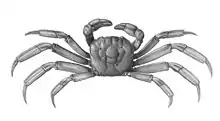Discoplax longipes
Discoplax longipes is a species of terrestrial crab. It is found in karstic caves on Pacific islands[2] and ranges from the Loyalty Islands to French Polynesia (the Guam population was recognized as a separate species, D. michalis, in 2015).[3] Mating occurs in the caves, after which the females migrate to the sea to release their fertilised eggs.[4] The genus Discoplax was for a long time synonymised with Cardisoma, but was resurrected in the late 20th century.[2]
| Discoplax longipes | |
|---|---|
 | |
| Scientific classification | |
| Kingdom: | |
| Phylum: | |
| Subphylum: | |
| Class: | |
| Order: | |
| Infraorder: | |
| Family: | |
| Genus: | |
| Species: | D. longipes |
| Binomial name | |
| Discoplax longipes | |
| Synonyms | |
|
Cardisoma longipes A. Milne-Edwards, 1867 | |
References
- Peter Davie (2010). "Discoplax longipes". World Register of Marine Species. Retrieved October 18, 2010.
- "Discoplax longipes". SANTO 2006. Institut de recherche pour le développement. September 12, 2006. Archived from the original on November 22, 2006. Retrieved October 18, 2010.
- Peter K. L. Ng & Hsi-Tse Shih (2015). "The land crabs of the Discoplax longipes A. Milne-Edwards, 1867 species group, with description of a new species from Guam (Crustacea: Decapoda: Brachyura: Gecarcinidae)". Zootaxa. 3980 (3). doi:10.11646/zootaxa.3980.3.3.
- Richard G. Hartnoll (2010). "Chastity belts and planktotrophic larvae: constraints on gecarcinid reproductive behaviour". In Peter Castro; Peter J. F. Davie; Peter K. L. Ng (eds.). Studies on Brachyura: A Homage to Daniéle Guinot. 11. pp. 153–171. ISBN 978-90-04-17086-5.
External links
 Media related to Discoplax longipes at Wikimedia Commons
Media related to Discoplax longipes at Wikimedia Commons Data related to Discoplax longipes at Wikispecies
Data related to Discoplax longipes at Wikispecies
This article is issued from Wikipedia. The text is licensed under Creative Commons - Attribution - Sharealike. Additional terms may apply for the media files.